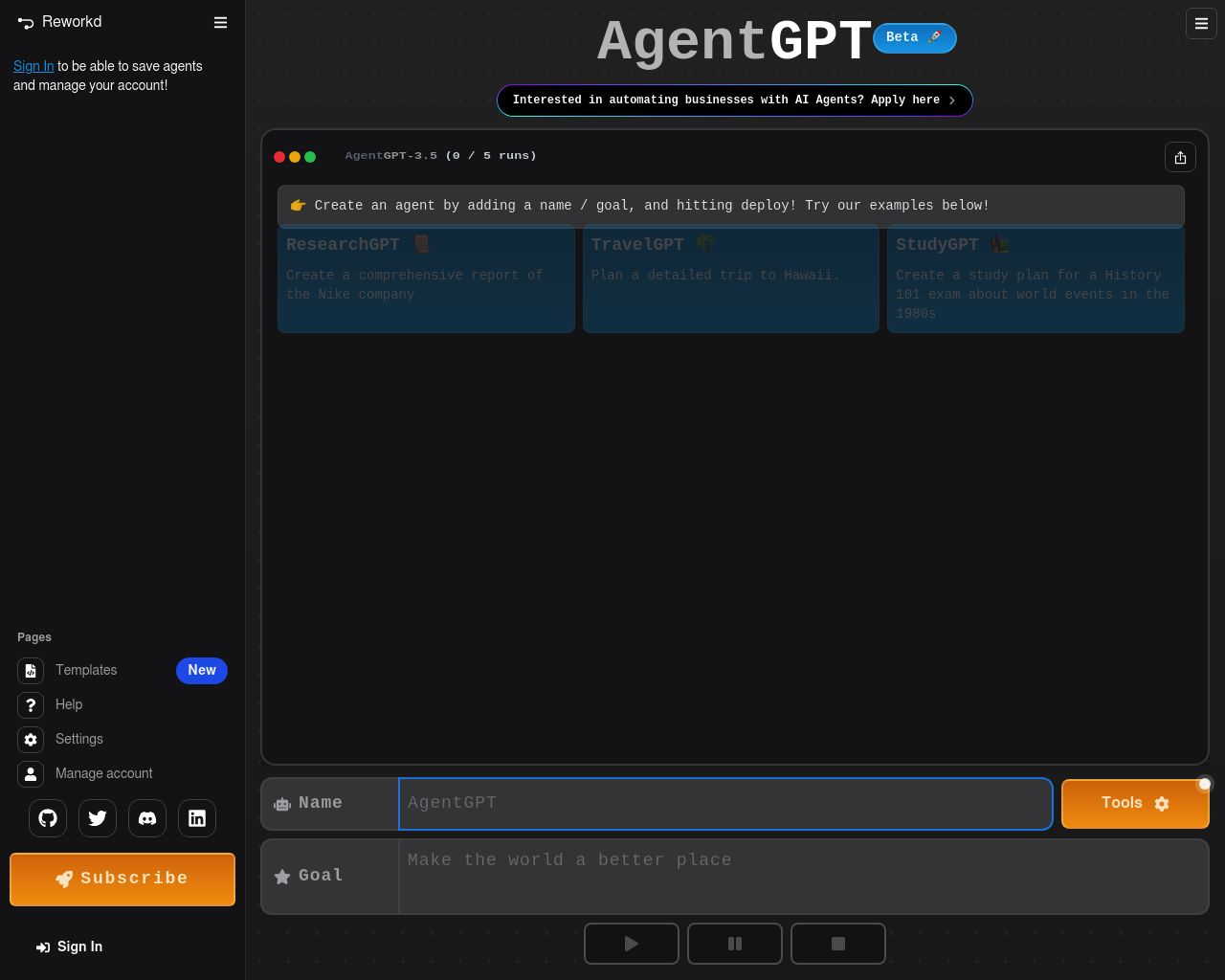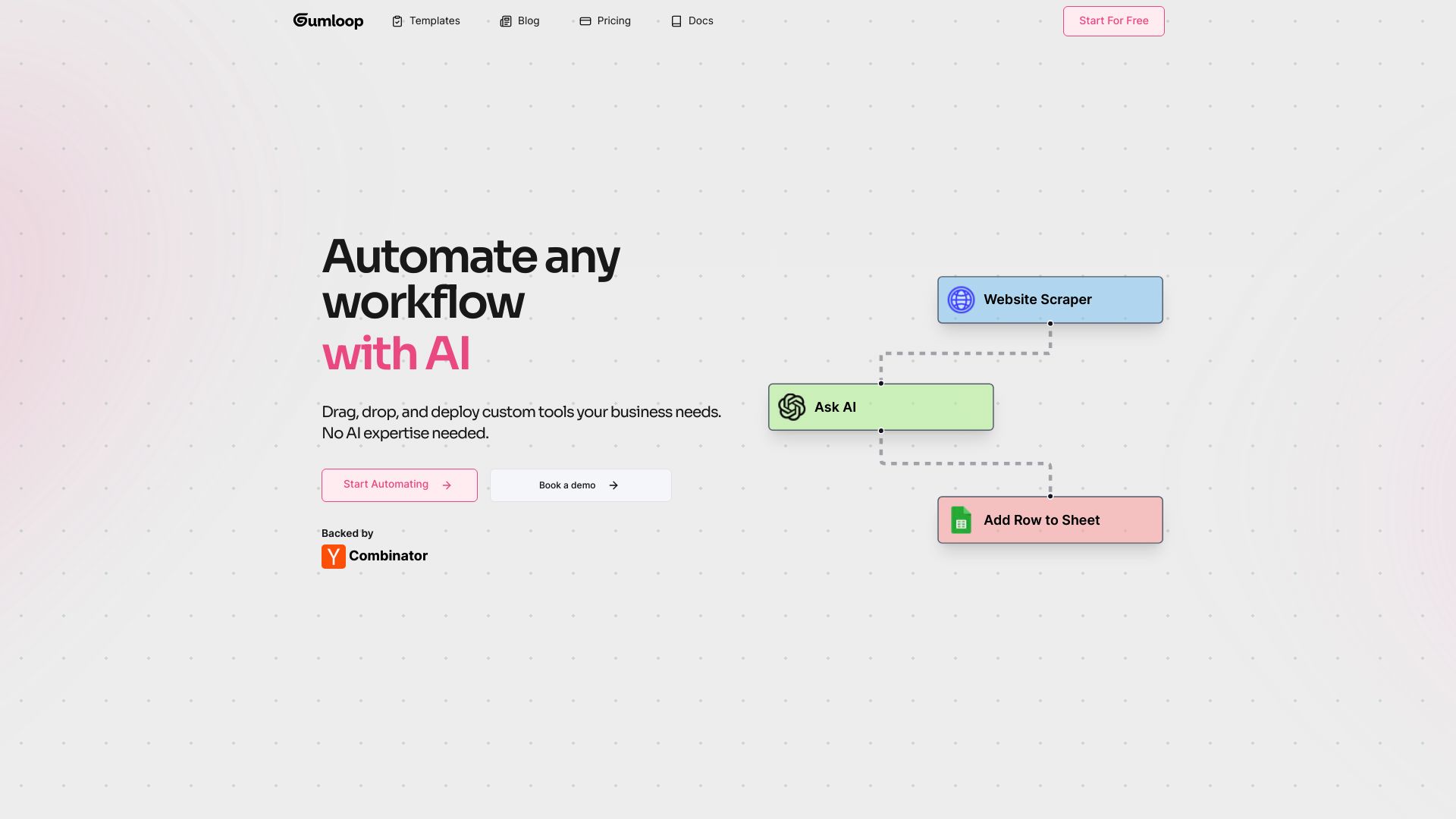AgentGPT vs. AgentHub: Comparing AI Agent Platforms
AI agents revolutionize how businesses automate tasks and process information. As demand grows for powerful yet accessible AI solutions, platforms like AgentGPT vs. AgentHub have emerged to meet diverse needs. This comparison explores their unique approaches to AI agent development, highlighting key features, strengths, and limitations.
We’ll examine how AgentGPT leverages advanced language models for sophisticated autonomous agents, while AgentHub focuses on no-code accessibility. By analyzing their core capabilities, security measures, and target audiences, we’ll equip you to choose the right AI platform for your specific requirements. We’ll also introduce SmythOS, a comprehensive alternative that combines the best of both worlds with additional powerful features.
AgentGPT Overview
AgentGPT empowers developers to create and deploy autonomous AI agents. The platform harnesses advanced models like GPT-3.5 and GPT-4 to enable sophisticated natural language processing capabilities.


AgentGPT’s core functionality revolves around autonomous AI agents that can independently pursue goals assigned by users. These agents leverage vector databases for memory management, enhancing their ability to maintain context and recall past interactions. This approach allows for more intelligent and contextually aware AI assistants.
AgentGPT’s core functionality revolves around autonomous AI agents… that leverage vector databases for memory management, enhancing their ability to maintain context and recall past interactions.
The platform integrates robust security measures, including OAuth authentication, to ensure secure access and data protection. While AgentGPT excels in creating autonomous agents with advanced memory capabilities, it lacks certain features like visual builders or no-code editors that could enhance accessibility for non-technical users.
AgentGPT supports both development and production environments, facilitating seamless agent creation and deployment. The platform’s API and webhook deployment options enable easy integration with existing systems. However, AgentGPT does not offer features like multi-agent collaboration or specialized deployment options such as site chat or scheduled agents, which could limit its versatility in some scenarios.
For developers and businesses seeking to leverage autonomous AI agents with strong natural language processing abilities, AgentGPT provides a solid foundation. Its focus on advanced AI models and memory management makes it particularly suitable for complex language-based tasks and applications requiring contextual understanding.
AgentHub Overview
AgentHub empowers businesses to harness AI automation without coding expertise. The platform’s drag-and-drop visual builder enables users to create customized AI workflows for tasks ranging from lead generation to marketing automation.


AgentHub’s pre-optimized agents tackle specific tasks without requiring users to select prompts or tools. The platform offers a variety of customizable nodes, allowing businesses to tailor workflows to their unique requirements. Integration capabilities ensure seamless connection with multiple platforms, enhancing flexibility and applicability across different business scenarios.
AgentHub empowers businesses to harness AI automation without coding expertise. The platform’s drag-and-drop visual builder enables users to create customized AI workflows…
While AgentHub excels in providing a no-code solution for AI automation, it lacks some advanced features. The platform doesn’t offer a debug mode, multimodal capabilities, or multi-agent collaboration. These limitations may impact users seeking more complex AI implementations or those requiring extensive troubleshooting tools.
AgentHub positions itself as a solution for democratizing AI automation across industries. Its focus on simplicity and pre-built templates makes it particularly appealing to non-technical users and small to medium-sized businesses looking to implement AI solutions without significant investment in technical resources. However, more technically advanced users or enterprises with complex integration needs may find the platform’s capabilities somewhat constrained compared to more developer-oriented solutions.
Feature Comparison
AgentGPT and AgentHub offer distinct approaches to AI agent development, with notable differences in core components and security features. AgentGPT excels in autonomous agent creation, leveraging advanced models like GPT-3.5 and GPT-4 for sophisticated natural language processing. Its vector database integration enhances memory management and contextual understanding. AgentGPT also provides robust security measures, including OAuth authentication, ensuring secure access and data protection.
AgentHub, in contrast, focuses on accessibility with its drag-and-drop visual builder, enabling users to create AI workflows without coding expertise. It offers pre-optimized agents for specific tasks and customizable nodes, allowing businesses to tailor solutions to their needs. However, AgentHub lacks some advanced features present in AgentGPT, such as debug mode, multimodal capabilities, and multi-agent collaboration. These gaps may limit AgentHub’s utility for users requiring more complex AI implementations or extensive troubleshooting tools.
While both platforms aim to democratize AI agent creation, they cater to different user needs. AgentGPT’s strength lies in its advanced AI capabilities and security features, making it suitable for developers and businesses requiring sophisticated, autonomous agents. AgentHub’s focus on simplicity and pre-built templates appeals more to non-technical users and small to medium-sized businesses seeking quick AI automation solutions without significant technical investment.
Feature Comparison Table
| AgentGPT | AgentHub | SmythOS | |
|---|---|---|---|
| CORE FEATURES | |||
| Environments (Dev, Production) | ❌ | ✅ | ✅ |
| Visual Builder | ❌ | ✅ | ✅ |
| No-Code Options | ❌ | ✅ | ✅ |
| Explainability & Transparency | ❌ | ✅ | ✅ |
| Debug Tools | ❌ | ✅ | ✅ |
| Multimodal | ❌ | ❌ | ✅ |
| Multi-Agent Collaboration | ❌ | ✅ | ✅ |
| Audit Logs for Analytics | ❌ | ✅ | ✅ |
| Work as Team | ❌ | ✅ | ✅ |
| Bulk Work | ❌ | ✅ | ✅ |
| Logs & Monitoring | ❌ | ✅ | ✅ |
| SECURITY | |||
| Constrained Alignment | ❌ | ❌ | ✅ |
| Data Encryption | ❌ | ❌ | ✅ |
| OAuth | ✅ | ❌ | ✅ |
| IP Control | ❌ | ❌ | ✅ |
| COMPONENTS | |||
| Huggingface AIs | ❌ | ❌ | ✅ |
| Zapier APIs | ❌ | ❌ | ✅ |
| All other APIs, RPA | ❌ | ✅ | ✅ |
| Classifiers | ❌ | ❌ | ✅ |
| Logic | ❌ | ✅ | ✅ |
| Data Lakes | ❌ | ❌ | ✅ |
| DEPLOYMENT OPTIONS (EMBODIMENTS) | |||
| Deploy as API | ❌ | ✅ | ✅ |
| Deploy as Webhook | ❌ | ✅ | ✅ |
| Staging Domains | ❌ | ❌ | ✅ |
| Production Domains | ❌ | ❌ | ✅ |
| API Authentication (OAuth + Key) | ❌ | ❌ | ✅ |
| Deploy as Site Chat | ❌ | ❌ | ✅ |
| Deploy as Scheduled Agent | ❌ | ✅ | ✅ |
| Deploy as GPT | ❌ | ❌ | ✅ |
| Scalability | ❌ | ✅ | ✅ |
| DATA LAKE SUPPORT | |||
| Hosted Vector Database | ❌ | ❌ | ✅ |
| Sitemap Crawler | ❌ | ❌ | ✅ |
| YouTube Transcript Crawler | ❌ | ❌ | ✅ |
| URL Crawler | ❌ | ✅ | ✅ |
| PDF Support | ❌ | ❌ | ✅ |
| Word File Support | ❌ | ❌ | ✅ |
| TXT File Support | ❌ | ❌ | ✅ |
Best Alternative to AgentGPT and AgentHub
SmythOS stands out as the superior alternative to AgentGPT and AgentHub, offering a comprehensive AI automation platform that combines power, flexibility, and ease of use. Our drag-and-drop interface enables users to create sophisticated AI workflows without extensive coding knowledge, democratizing AI development for businesses of all sizes.
SmythOS stands out as the superior alternative to AgentGPT and AgentHub, offering a comprehensive AI automation platform that combines power, flexibility, and ease of use.
Unlike AgentGPT and AgentHub, SmythOS provides a complete ecosystem for AI agent creation and deployment. We support multiple environments, including development and production, ensuring seamless scaling from prototype to enterprise-level solutions. Our visual builder and no-code options make AI accessible to both technical and non-technical users, bridging the gap that other platforms often struggle to address.
SmythOS excels in its feature set, offering capabilities that AgentGPT and AgentHub lack. Our platform supports multimodal interactions, enabling AI agents to process and respond to various data types, including text, images, and voice. This versatility opens up a wide range of use cases, from advanced customer service bots to complex data analysis tools. Additionally, our multi-agent collaboration feature allows for the creation of sophisticated AI systems that can tackle complex, multi-faceted problems.
Our platform supports multimodal interactions, enabling AI agents to process and respond to various data types, including text, images, and voice.
Security and scalability set SmythOS apart from competitors. We provide robust data encryption, OAuth integration, and IP control features, ensuring that your AI solutions meet the highest standards of data protection and access management. Our platform’s ability to deploy agents as APIs, webhooks, or scheduled tasks, coupled with our scalable infrastructure, means that SmythOS can grow with your business needs, from small-scale projects to enterprise-wide implementations.
By choosing SmythOS, you’re not just selecting an AI agent builder; you’re investing in a future-proof platform that continually evolves to meet the changing landscape of AI technology. Our commitment to innovation, coupled with our user-centric approach, makes SmythOS the ideal choice for businesses looking to harness the full potential of AI automation.
Conclusion
AgentGPT and AgentHub each offer unique approaches to AI agent development, catering to different user needs. AgentGPT excels in creating sophisticated, autonomous agents with advanced natural language processing capabilities, leveraging models like GPT-3.5 and GPT-4. Its vector database integration enhances contextual understanding, making it ideal for complex language tasks. AgentHub, on the other hand, focuses on accessibility with its no-code platform, offering pre-optimized agents and customizable workflows that appeal to non-technical users and small to medium-sized businesses.
While both platforms have their strengths, SmythOS emerges as the superior choice, combining the best of both worlds and offering additional powerful features. SmythOS provides a user-friendly drag-and-drop interface similar to AgentHub, making it accessible to non-technical users. At the same time, it offers advanced capabilities comparable to AgentGPT, including support for multiple AI models and sophisticated agent development.
SmythOS stands out with its extensive integration ecosystem, supporting over 300,000 integrations and allowing seamless connection with various APIs, data sources, and tools. This versatility, combined with features like multi-agent collaboration, debug mode, and flexible deployment options, makes SmythOS an ideal solution for businesses of all sizes and technical expertise levels.
For those looking to harness the full potential of AI agents, we recommend exploring SmythOS. Create a free SmythOS account to experience the platform’s capabilities firsthand. With its comprehensive feature set, intuitive interface, and powerful integrations, SmythOS offers the tools you need to revolutionize your workflows and drive innovation in your organization. Discover our diverse range of AI-powered agent templates to jumpstart your AI journey and see how SmythOS can transform your business processes.
Last updated:
Disclaimer: The information presented in this article is for general informational purposes only and is provided as is. While we strive to keep the content up-to-date and accurate, we make no representations or warranties of any kind, express or implied, about the completeness, accuracy, reliability, suitability, or availability of the information contained in this article.
Any reliance you place on such information is strictly at your own risk. We reserve the right to make additions, deletions, or modifications to the contents of this article at any time without prior notice.
In no event will we be liable for any loss or damage including without limitation, indirect or consequential loss or damage, or any loss or damage whatsoever arising from loss of data, profits, or any other loss not specified herein arising out of, or in connection with, the use of this article.
Despite our best efforts, this article may contain oversights, errors, or omissions. If you notice any inaccuracies or have concerns about the content, please report them through our content feedback form. Your input helps us maintain the quality and reliability of our information.
